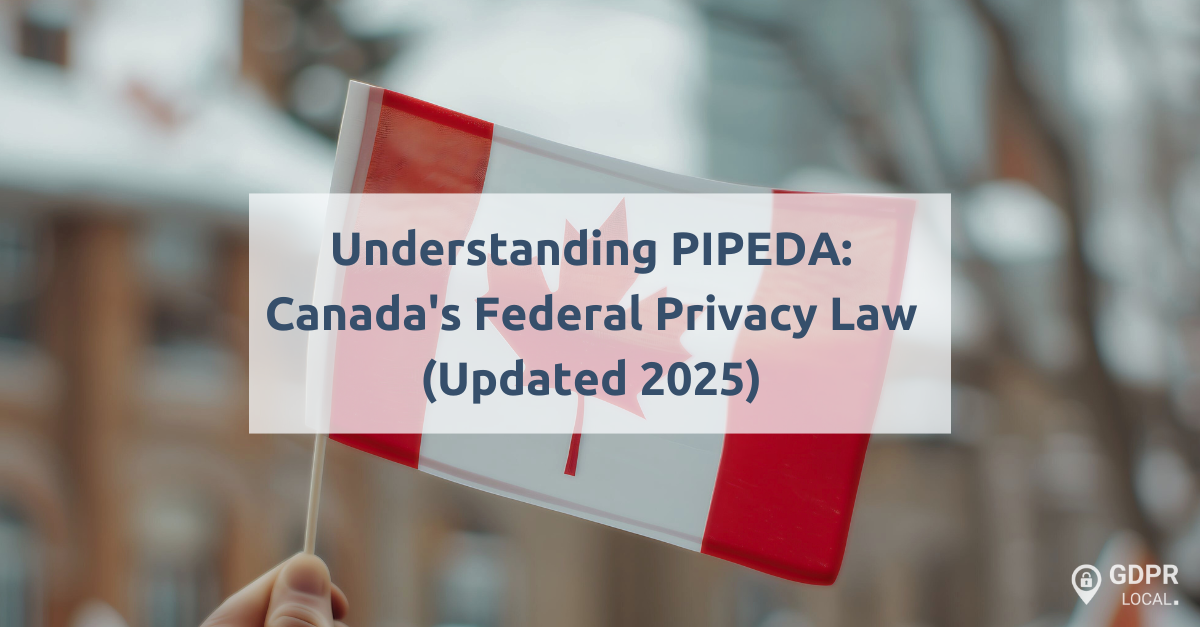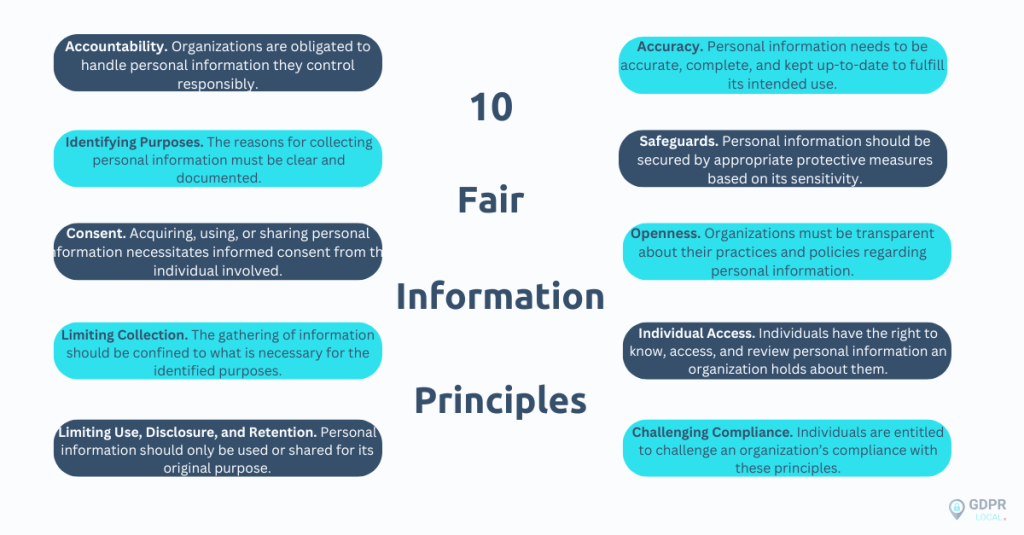
Understanding PIPEDA: Canada’s Federal Privacy Law (Updated 2025)
In this blog, we’re going to explore the Personal Information Protection and Electronic Documents Act (PIPEDA). We’ll explain what PIPEDA is, who it affects, and the main principles behind it. You’ll also learn about the rights it grants to individuals and the obligations it places on businesses. Our goal is to help you understand how to comply with the regulation and why it’s important to protect personal information in a business environment.
If you need help understanding PIPEDA requirements, this is the right place for you.
What is PIPEDA?
The Personal Information Protection and Electronic Documents Act (PIPEDA) is a key Canadian law that regulates how private-sector organizations handle personal information during commercial activities. Established in the early 2000s, PIPEDA requires businesses to manage personal data with stringent privacy and security standards, irrespective of whether it’s collected, used, or disclosed within Canada.
PIPEDA emphasizes individual control over personal information. It mandates clear guidelines for businesses, including securing consent for data use, providing data access upon request, and ensuring secure storage and proper disposal of personal data.
Who does PIPEDA apply to?
PIPEDA governs a wide array of entities and how they process personal information, including:
Federally regulated businesses – This means that organisations operating across provincial borders in sectors like banking, telecommunications, airlines, and railways must comply with PIPEDA when managing both consumer and employee personal data.
Businesses in provinces without similar privacy laws – In provinces that haven’t enacted their own “substantially similar” privacy legislation (currently excluding British Columbia, Alberta, and Quebec), PIPEDA sets the standard for how businesses must collect, use, and disclose personal information during commercial activities.
– Information that crosses borders – Every company in Canada that deals with personal information crossing provincial or international lines for commercial activities must adhere to PIPEDA. This applies across Canada, even in provinces with their own privacy laws.
Who is Exempt?
While PIPEDA’s scope is extensive, certain exemptions are noteworthy:
– Federal government departments and agencies are generally exempt from PIPEDA. They operate under a separate law called the Privacy Act, which sets out similar, but not identical, privacy rules for the public sector.
– Employee personal information is handled in the context of an employment relationship. While PIPEDA strongly protects consumer data, it generally doesn’t cover managing employees’ personal information. This includes details necessary for hiring, payroll, benefits, and performance management. It’s important to note that provinces may have separate rules around employee privacy.
– Data collected for personal, journalistic, or artistic purposes. This exemption helps protect individual privacy and freedom of expression.
The 10 Fair Information Principles
PIPEDA establishes ten essential principles that guide the protection and handling of personal information:

Rights of Data Subjects under PIPEDA
The Right to Erasure
PIPEDA does not grant individuals a direct right to erasure. Instead, it specifies that personal information that is no longer necessary for the purposes for which it was originally collected must be destroyed, erased, or made anonymous. Under PIPEDA, organizations are obligated to establish guidelines and implement procedures that effectively manage the destruction of personal information.
Right to Amend Information
If an individual can prove that their personal information held by an organization is inaccurate or incomplete, PIPEDA ensures they have the right to correct it. This could involve correcting, deleting, or adding information. Crucially, any amendments must also be communicated to any third parties with access to the incorrect data.
Right to be Informed
From the moment of collection, individuals should be clearly informed about the purposes for which their data is being collected, either in writing or orally, depending on the circumstances of the collection. PIPEDA requires individuals to knowingly and voluntarily consent to using their personal information for stated purposes.
Right to Object/Right to Withdraw Consent
Under PIPEDA, individuals can withdraw their consent at any point, provided they adhere to any legal or contractual obligations and give reasonable notice. Organisations are required to clarify the consequences of withdrawing consent. Nonetheless, organizations are permitted to keep the data for the duration needed to achieve the original purpose of collection.
Right of Access
PIPEDA grants individuals the right to inquire about whether an organization holds their personal information and how it is used and disclosed. Organizations must provide access to this information when requested. However, exceptions exist, such as when the information could disclose personal details about someone else or is covered by attorney-client privilege. Organizations must reply to these requests within 30 days, but this timeframe may be extended under certain conditions.
Right to Data Portability
Unlike some privacy regulations globally, PIPEDA does not explicitly provide a right to data portability—that is, the right to move one’s data from one service provider to another.
Do I need to comply with PIPEDA?
You must comply with PIPEDA if your organization collects, uses, or discloses personal information during commercial activities in Canada. This applies whether you’re based in Canada or not, as long as you handle the data of Canadian residents. PIPEDA applies to federally regulated industries like banking, telecommunications, and transportation, regardless of provincial laws. Even if you operate in a province with its own privacy legislation, such as Quebec, Alberta, or British Columbia, PIPEDA still applies to interprovincial and international data transfers. If your business deals with Canadian consumers or clients and handles their personal information, compliance with PIPEDA is crucial.
How to Ensure Compliance With PIPEDA
To remain compliant with PIPEDA:
– Adhere to the 10 Fair Information Principles. Ensure your organization implements and maintains policies and procedures that meet the requirements of these principles.
– Ensure Mechanisms are in Place for Data Subjects to Exercise Their Rights. Set up accessible and efficient systems that allow individuals to access, correct, and control how their personal information is used.
– Establish Procedures for Handling Privacy Breaches. Develop and implement protocols to respond swiftly to any privacy breaches. This should include clear methods for detecting, reporting, and mitigating breaches both internally and to external authorities as mandated by PIPEDA.
What are the penalties if you don’t comply with PIPEDA?
You could face serious consequences if your organization fails to comply with PIPEDA. The Office of the Privacy Commissioner of Canada (OPC) can launch investigations and issue public reports detailing your non-compliance, damaging your reputation. In serious violations, the OPC can refer the matter to the Federal Court, which may order your organization to change its practices and award damages to affected individuals. Financial penalties could also apply under proposed legislative updates, such as Bill C-27, reaching up to $10 million CAD or 3% of global revenue, whichever is higher. These changes aim to give the OPC stronger enforcement powers and align Canadian law more closely with global privacy standards like the GDPR.
How We Can Assist
Our privacy experts at GDPRLocal can provide your business with customized solutions for compliance with PIPEDA, helping to establish a reputation that distinguishes you from the competition. By prioritizing privacy, you enhance consumer trust, safeguard your brand, and reduce the risk of expensive penalties.
Contact us today for a consultation—we’ll help you create accurate privacy notices and develop compliant data collection and handling systems.